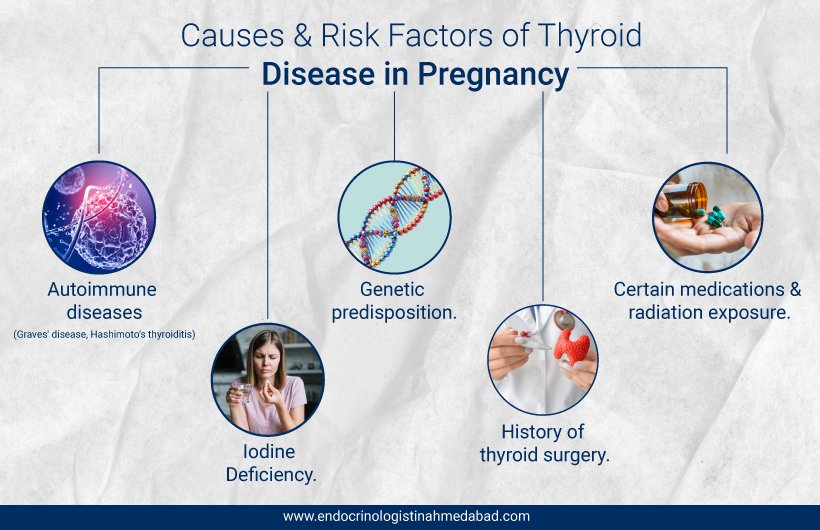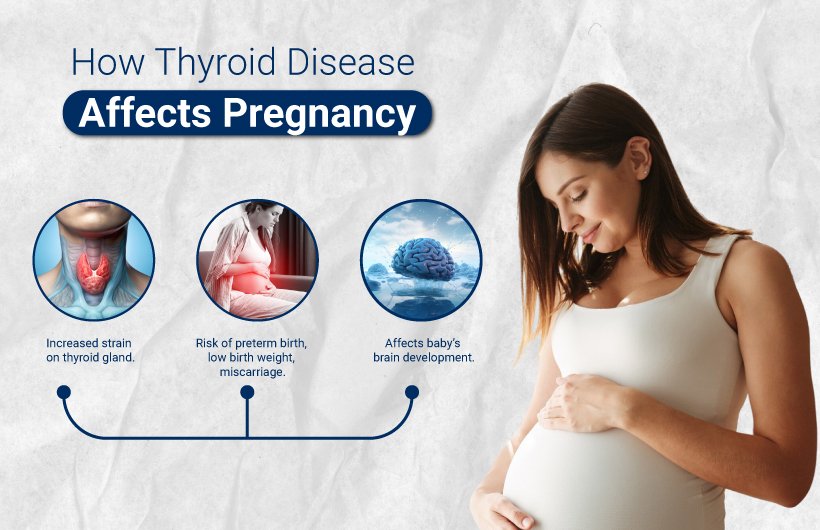Thyroid disease is a common yet often overlooked condition that can significantly impact pregnancy. Analytical findings show that 2-3% of expectant mothers deal with thyroid disorders that may harm both mother and child unless they receive treatment. The successful outcome of a pregnancy and birth of a healthy baby demands proper thyroids management. The effects of Thyroid problems during pregnancy remain unclear, and so does the strategy for its management.
What is Thyroid Disease?
The thyroid is a small, butterfly-shaped gland in the neck. It helps control body functions, energy levels, and metabolism. When the thyroid doesn’t work properly, it can lead to health problems.
During pregnancy, thyroid issues like hyperthyroidism (overactive thyroid) and hypothyroidism (underactive thyroid) can occur. Since each thyroid problem affects the body differently, personalized care is important for proper treatment.
Types of Thyroid Disorders
Hyperthyroidism:
- Such a condition exists when the thyroid gland produces too many thyroid hormones thus becoming overactive.
- The signs of hyperthyroidism include heart rate acceleration accompanied by weight reduction and tremors together with nervous behaviour.
- Graves’ disease serves as the standard cause which leads to hyperthyroidism along with being an autoimmune disorder.
Hypothyroidism:
- Having a thyroid gland that produces insufficient hormones leads to Hypothyroidism.
- An underactive thyroid gland results in tiredness weight gain and depressive feelings and slowed metabolic functions occur.
- The autoimmune response known as Hashimoto’s thyroiditis causes most cases of this disorder.
Causes and Risk Factors

Several factors contribute to Thyroid problems during pregnancy, including:
- Autoimmune conditions such as Hashimoto’s thyroiditis and Graves’ disease.
- A lack of iodine in the body leads to dysfunction of normal thyroid operation.
- Thyroid disease predisposes families because it tracks from generation to generation.
- Previous thyroid disorders or history of thyroid surgery.
The thyroid function suffers because of particular medications combined with radiation treatments.
How Thyroid Disease Affects Pregnancy
Pregnancy creates higher than normal strain on thyroid glands which increases their need for thyroid hormones. The performance of thyroid function directly affects the health outcomes for mothers as well as the fetus.

Impact on the Mother of Thyroid disease and pregnancy
Impact on the Mother
Untreated thyroid disease results in these thyroid problems during pregnancy for affected women.
- The combination of tiredness seriously impedes a pregnant woman’s ability to handle day-to-day pregnancy tasks.
- Mood swings and increased anxiety or depression.
- Excessive weight variations as a result of thyroid impairment affect a person’s overall health status.
- The condition can generate elevated blood pressure and preeclampsia difficulties that raise delivery complications chances.
Risks of thyroid disease in pregnancy to the Baby
- Higher risk of preterm birth, which can affect the baby’s development.
- Low birth weight, makes the baby more vulnerable to health complications.
- Cognitive and developmental pregnancy with thyroid issues, affecting brain function and growth.
- Increased chance of miscarriage or stillbirth.
Symptoms of thyroid disease
Recognizing the symptoms of thyroid disease is crucial for early intervention. Some warning signs include:
- Sudden weight gain or loss
- Swelling in the neck (goitre)
- Increased or decreased heart rate
- Extreme sensitivity to cold or heat
- Unexplained fatigue or nervousness
Managing Thyroid disease and pregnancy
Effective Managing thyroid conditions in pregnancy is essential to ensure a healthy pregnancy. This involves early diagnosis, appropriate treatment, and regular monitoring.
Importance of Early Diagnosis
Early detection can prevent complications. Thyroid function tests (TSH, T3, T4) should be part of routine prenatal screenings.
Treatment Options
Medications:
- Hypothyroidism: Treated with levothyroxine, a synthetic thyroid hormone that maintains normal hormone levels.
- Hyperthyroidism: Managed using antithyroid drugs that control excessive hormone production. Some medications may need adjustment to minimize risks to the baby.
Lifestyle Modifications:
- Eating a balanced diet rich in iodine and selenium to support thyroid function.
- Practising stress management techniques like yoga and meditation.
- Getting regular exercise to maintain overall well-being.
Monitoring Thyroid Levels
Routine check-ups with an endocrinologist or gynaecologist are essential for tracking and managing thyroid conditions in pregnancy. Frequent blood tests help ensure that hormone levels remain stable.
When to Seek Medical Help
Some symptoms indicate a need for immediate medical attention during Thyroid disease and pregnancy:
- Severe fatigue, dizziness, or unexplained palpitations.
- Noticeable swelling in the neck
- The inability to control weight persists when following lifestyle adjustments
- Mood swings, depression, or excessive nervousness.
Neglecting the signs of a medical issue will result in dangerous outcomes. Rendering assistance from a thyroid specialist at the beginning of the disease process leads to major improvements.
Essential Tips for Managing Thyroid Disease During Pregnancy
People should maintain exact adherence to prescribed medication amounts to prevent hormone imbalance conditions for Thyroid problems during pregnancy.
- People should include dairy, seafood and eggs in their diet because they provide important iodine to maintain thyroid health.
- The practice of deep breathing forms one method to control stress levels among pregnant women.
- Staying hydrated while consuming nutritious foods ensures proper physical health.
- Regular visits to an Endocrinologist in Ahmedabad will let you monitor thyroid function and help decide needed treatment adjustments.
Conclusion
Proper management of Thyroid disease and pregnancy becomes possible through early diagnosis along with suitable medication prescriptions and lifestyle modifications. Peaceful pregnancies along with growing healthy babies are achievable for women who receive appropriate thyroid treatment. The secret to a streamlined journey requires ongoing proactive action together with healthcare providers.
If you’re pregnant and managing thyroid disease, don’t take chances with your health. Consult Dr Moxit Shah, an experienced specialist, for personalized care and expert guidance. Have questions? Share your thoughts in the comments below or book a consultation today!






